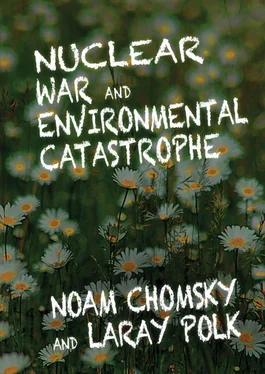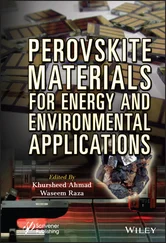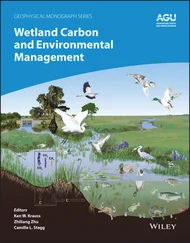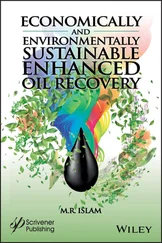If the NSC decides measures are to be undertaken to assist Iraq, our best chance of influencing cessation of CW use may be in the context of informing Iraq of these measures. It is important, however, that we approach Iraq very soon in order to maintain the credibility of U.S. policy on CW, as well as to reduce or halt what now appears to be Iraq’s almost daily use of CW.
Drafted: PM/TMP: JLeonard
11/01/83: ph. 632-4814
WANG #2485P
Clearances: PM/TMP: PMartinez
PM/P — RBeers
PM/RSA — PTheros
NEA — DTSchneider
P — AKanter
NEA/ARN: DLMack
INR/PMA: DHowells
Source: National Security Archive
Appendix 7
Open Letter to Africa, December 12, 2011
On December 7, 2011, during the UN Climate Change Conference in Durban, South Africa, Sen. James Inhofe of Oklahoma delivered a video message aimed at the international delegation: “Today I’m happy to bring you the good news about the complete collapse of the global warming movement and the failure of the Kyoto process…. For the past decade, I have been the leader in the United States Senate standing up against global warming alarmism…. You should know that global warming skeptics everywhere wish we could be with you celebrating the final nail in the coffin on location in South Africa.” Inhofe is the minority leader of the Environment and Public Works Committee. His top campaign contributors include Koch Industries (oil, chemicals, and forest-derived products); Murray Energy (coal); Devon Energy (oil and gas); Contran Corporation (chemicals, metals, and radioactive waste disposal); and Robison International (lobbyists for defense, nuclear energy, GE, and IBM).
US Senator’s Statement At COP17 Disappointed US
We are writing as US citizens to express our grave disappointment about the views expressed by our government representatives at COP17. On December 7, US Senator James Inhofe delivered a video message to the Durban delegation which was ill-informed and mean-spirited.
We, like many others in the US, accept the consensual science on climate change: it is happening and people are suffering from water shortages, the acidification of the oceans, and extreme weather events.
The carbon load in the atmosphere, caused mainly by fossil fuel combustion, is too great and must be reduced. This reduction must begin before 2020.
While it is true that the US is a democracy, it is also true that Inhofe, who serves on a very powerful committee on environmental issues, continues to do the dirty work for industry.
Industry interests are the main impediment to any necessary movement on climate change which must happen on a global scale.
It is more accurate to say we have a democracy that uses free elections to put in place known obstructionists, and a media that disproportionally gives a forum to economically driven ideology over sound science.
JACK MIMS AND LARAY POLK
Dallas
Source: Mercury (South Africa)
Appendix 8
Anjali Appadurai’s Speech in Durban, December 9, 2011
On December 8, 2011, as US climate negotiator Todd Stern took the stage at the UN Climate Change Conference, Abigail Borah, a Middlebury College student, stood up from the audience and gave a short speech before being escorted out by security:“2020 is too late to wait. We need an urgent path to a fair, ambitious and legally binding treaty. You must take responsibility to act now, or you will threaten the lives of the youth and the world’s most vulnerable. You must set aside partisan politics and let science dictate decisions.” The day after Borah’s speech, another student, Anjali Appadurai, addressed the delegation from the podium. Both speeches were met with applause.
AMY GOODMAN: A number of protests are being held today at the climate change conference to protest the failure of world leaders to agree to immediately agree to a deal of binding emissions cuts. Earlier today, Anjali Appadurai, a student at the College of the Atlantic in Bar Harbor, Maine, addressed the conference on behalf of youth delegates.
CHAIRPERSON: I’d now like to give the floor to Miss Anjali Appadurai with College of the Atlantic, who will speak on behalf of youth non-governmental organizations. Miss Appadurai, you have the floor.
ANJALI APPADURAI: I speak for more than half the world’s population. We are the silent majority. You’ve given us a seat in this hall, but our interests are not on the table. What does it take to get a stake in this game? Lobbyists? Corporate influence? Money? You’ve been negotiating all my life. In that time, you’ve failed to meet pledges, you’ve missed targets, and you’ve broken promises. But you’ve heard this all before.
We’re in Africa, home to communities on the front line of climate change. The world’s poorest countries need funding for adaptation now. The Horn of Africa and those nearby in KwaMashu needed it yesterday. But as 2012 dawns, our Green Climate Fund remains empty. The International Energy Agency tells us we have five years until the window to avoid irreversible climate change closes. The science tells us that we have five years maximum. You’re saying, “Give us 10.”
The most stark betrayal of your generation’s responsibility to ours is that you call this “ambition.” Where is the courage in these rooms? Now is not the time for incremental action. In the long run, these will be seen as the defining moments of an era in which narrow self-interest prevailed over science, reason and common compassion.
There is real ambition in this room, but it’s been dismissed as radical, deemed not politically possible. Stand with Africa. Long-term thinking is not radical. What’s radical is to completely alter the planet’s climate, to betray the future of my generation, and to condemn millions to death by climate change. What’s radical is to write off the fact that change is within our reach. 2011 was the year in which the silent majority found their voice, the year when the bottom shook the top. 2011 was the year when the radical became reality.
Common, but differentiated, and historical responsibility are not up for debate. Respect the foundational principles of this convention. Respect the integral values of humanity. Respect the future of your descendants. Mandela said, “It always seems impossible, until it’s done.” So, distinguished delegates and governments around the world, governments of the developed world, deep cuts now. Get it done.
Mic check!
PEOPLE’S MIC: Mic check!
ANJALI APPADURAI: Mic check!
PEOPLE’S MIC: Mic check!
ANJALI APPADURAI: Equity now!
PEOPLE’S MIC: Equity now!
ANJALI APPADURAI: Equity now!
PEOPLE’S MIC: Equity now!
ANJALI APPADURAI: You’ve run out of excuses!
PEOPLE’S MIC: You’ve run out of excuses!
ANJALI APPADURAI: We’re running out of time!
PEOPLE’S MIC: We’re running out of time!
ANJALI APPADURAI: Get it done!
PEOPLE’S MIC: Get it done!
ANJALI APPADURAI: Get it done!
PEOPLE’S MIC: Get it done!
ANJALI APPADURAI: Get it done!
PEOPLE’S MIC: Get it done!
CHAIRPERSON: Thank you, Miss Appadurai, who was speaking on behalf of half of the world’s population, I think she said at the beginning. And on a purely personal note, I wonder why we let not speak half of the world’s population first in this conference, but only last.
AMY GOODMAN: That was a speech by Anjali Appadurai here in Durban at the U.N. climate change talks. Just after her speech, as you heard, she led a mic check from the stage, a move inspired by the Occupy Wall Street protests around the world. This is Democracy Now! , democracynow.org, The War and Peace Report. I’m Amy Goodman, as we broadcast live from Durban, South Africa. Back in a moment.
Читать дальше












